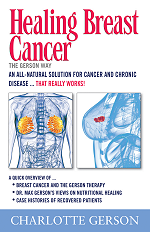| |
Archived from
Charlotte Gerson's booklet

Story
Alexandra's story is particularly important, because it illustrates
one of the Gerson Therapy's great potentials: to cure the patient
and help the family as well to improve and maintain their health.
In 1984, Alexandra was diagnosed with invasive, intraductal
carcinoma after a lumpectomy. The margins in her breast were not
'clean' - meaning that the lumpectomy had not removed all the
cancer tissue which was present. The surgeon suggested that her
lymph nodes needed to be examined and this procedure would
have to be" followed by removal of her breast. A close friend was
able to secure for her an appointment with the Head of Oncology
at Stanford University. After the examination, the oncologist
stated that "This is a typical two-to-ten year illness. But I don't
think that you'll be alive in two years. Get your affairs in order
and have the best time you can. And don't worry; we have powerful
medications for you when your pain begins." There were
complications. Prior to her diagnosis, she was suffering from
severe depression, chronic low blood sugar, anger after her divorce
from an alcoholic husband after 17 years of marriage, and three
teenagers who were on alcohol and drugs.
There was tremendous stress.
After the examination at Stanford, her daughter drove her
home. Then Alexandra made an appointment with a radiation
oncologist. At his office, she was shocked to see all the sick,
bandaged people, looking severely ill and in wheelchairs. She
couldn't stand it and walked out. She was crying as she drove
home. Close to home, she noted that some of the lawns were of a
lively green, while others looked brown and sick. It struck her that
if the right food could do this to grass, why should the body not
respond in the same way, too? She figured that with the right
nutrition she could at least keep going for, say, another five years
or until a cure for cancer were found. Then she heard a clear voice
which said to her, "You can feed and nourish your mind and body
and become well!" At that point, she sped past her house and to a
health food store. She noted a lot of books on dieting for weight
loss; but the owner directed her to three books on nutrition and
cancer.
One book was that of Edie Mae Hunsberger, and how she
healed herself of cancer. The second book was on macrobiotics.
The third book was Gerson's A Cancer Therapy.
The owner again cautiously approached her and said she
should use the Gerson book. "It is the hardest therapy, but the
best." She took the books home and started to read. Edie Mae's
story didn't satisfy her, since Alexandra felt that it was not truly a
healing treatment. In the macrobiotic book she found a lot of
emphasis on Oriental philosophy which seemed foreign and
removed from her. The Gerson book frightened her at first, but
she realized that here was a total healing philosophy. She called
the Gerson Institute and in four more days was at the Mexican
Gerson Therapy Hospital; "La Gloria" at that time.
She came alone and was on her own. She had no support and a
great deal of negativity from her family, who were horrified about
her going for 'alternative' therapies and not following the doctor's
advice. She struggled for quite a while. After three months, a new
lump appeared, which had to be removed surgically. She continued
to believe in the Gerson Therapy and fought on. She also
added psychological counseling with Simonton and from Louise
Hay. After two years, she looked really 'fabulous'; but it was only
after some four years that she felt really well.
Her older son had dropped out of High School in his Junior
year because of alcoholism. By age 24, he was an 'end stage'
alcoholic. At that point, Alexandra brought him to the Mexican
Gerson Hospital for treatment. In just three days he had no more
cravings for cigarettes or alcohol. He spent a total of ten days at
the Gerson Therapy hospital and left, gentle and relaxed.
In December 1993, Alexandra's father, aged 87, suffered a heart
attack. After the ambulance delivered him to the Emergency
Room, he got a stroke. He was in the hospital three weeks, was
given a pacemaker and lots of drugs. Then his wife was told to
take him to a nursing home. At this time, Alexandra urged her
mother to take him home instead, and headed right out there. She
was shocked at the sight of her father: sitting in a wheelchair, head
drooping to one side, drooling. But she worked with him day and
night, cautiously put him on the Gerson Therapy, gave him some
juices at first, while he was still taking all the prescribed drugs,
then slowly increased the intensity. In three months he was out of
the wheelchair. In August 1994 (eight months after the heart
attack and stroke) he walked into the Department of Motor
Vehicles office and applied for (and got!) a driver's license. He
remained well, celebrated his 90th birthday in August 1996, and
passed away a few years later.

|
|
